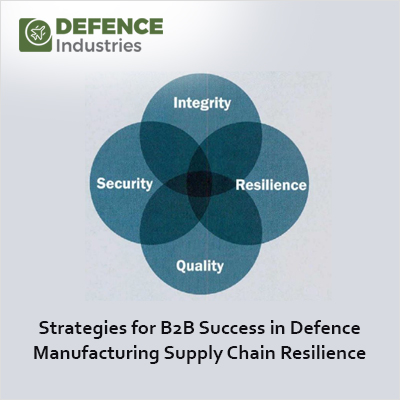Strategies for B2B Success in Defence Manufacturing Supply Chain Resilience 25 June 2024

In the ever-evolving landscape of defence manufacturing, the imperative of resilient supply chains cannot be overstated for sustained success. The intricacies of defence supply chains pose unique challenges and disruptions, necessitating a strategic and forward-thinking approach. This article aims to explore these challenges comprehensively and provide strategic insights for B2B partners, empowering them to fortify collaboration and effectively mitigate risks within the complex and dynamic environment of defence manufacturing supply chains.
Challenges in Defence Supply Chains:
Defence supply chains operate within a multifaceted environment fraught with challenges. Geopolitical uncertainties introduce a layer of unpredictability, ranging from shifting alliances to trade tensions, impacting the sourcing of crucial materials and components. Resource constraints, encompassing limitations in raw materials, skilled labor, and production capacities, further compound the intricacies. Technological dependencies add another layer of complexity, as reliance on specific software, hardware, or components introduces risks if technological advancements or changes in suppliers occur. Detailing these challenges provides a foundational understanding essential for devising effective strategies.
Disruptions and Their Impacts:
Past disruptions, such as geopolitical tensions, natural disasters, or global pandemics, have had profound impacts on defence supply chains. Analyzing these historical events sheds light on vulnerabilities and highlights areas for improvement. Understanding the consequences of disruptions is crucial for developing resilience strategies, allowing B2B partners to proactively prepare for and respond to unforeseen challenges. The insights gained from disruptions contribute to a more robust and adaptive supply chain.
Building Resilience:
Building resilience in defence manufacturing supply chains requires a holistic approach. Diversifying suppliers is a key strategy to reduce dependency and minimize risks associated with single-source vulnerabilities. Implementing robust risk management frameworks involves identifying potential threats and developing proactive strategies to mitigate their impact. Adopting agile production processes ensures flexibility in responding to changing circumstances, enabling the supply chain to adapt swiftly to unforeseen challenges. The integration of these strategies collectively reinforces the supply chain's ability to maintain continuity and stability.
Collaborative Approaches for Resilience:
Collaboration among B2B partners is paramount for building a resilient supply chain. Open communication, information sharing, and coordinated contingency planning contribute to a collective approach that enhances the overall resilience of the defence manufacturing ecosystem. By fostering strong partnerships and a collaborative mindset, B2B entities create a network capable of collectively addressing challenges and adapting to disruptions, thereby strengthening the entire supply chain.
Technology Integration for Supply Chain Visibility:
The integration of technology significantly enhances the robustness of defence manufacturing supply chains by providing heightened visibility. Real-time tracking and data analytics serve as essential tools, offering B2B partners the capability to proactively monitor and manage operations within the supply chain. Utilizing these technological resources enables partners to swiftly identify potential disruptions, optimize inventory management, and improve overall supply chain efficiency. The instrumental role of technology lies in furnishing critical insights for informed decision-making and effective risk mitigation within the defence manufacturing supply chain.
Risk Mitigation Strategies:
Effective risk mitigation is central to sustaining a resilient supply chain. B2B partners can implement specific strategies, such as dual-sourcing critical components to minimize the impact of supplier disruptions. Developing strategic stockpiles of essential materials ensures a buffer against unforeseen shortages while establishing alternative logistics routes provides flexibility in transportation. Proactive risk management strategies contribute to the supply chain's ability to navigate disruptions while maintaining operational integrity.
Regulatory Compliance and Adaptability:
The regulatory landscape governing defence manufacturing is intricate and subject to change. Compliance with stringent regulations is non-negotiable, requiring B2B partners to stay abreast of evolving requirements. Cultivating adaptability within the supply chain is equally crucial, ensuring a seamless response to regulatory changes. Balancing compliance with adaptability allows defence manufacturing supply chains to navigate a dynamic regulatory environment effectively, minimizing risks associated with non-compliance.
Capacity Building and Skill Development:
A skilled and adaptable workforce is integral to the resilience of defence manufacturing supply chains. Capacity building and ongoing skill development initiatives ensure that the workforce is equipped to navigate challenges, implement innovative solutions, and contribute to the overall resilience of the supply chain. Investing in the capabilities of the workforce not only strengthens internal operations but also fosters a culture of continuous improvement and adaptability.
Conclusion:
The strategic imperative of supply chain resilience cannot be overstated. B2B partners, armed with an in-depth acknowledgment of challenges, a comprehensive understanding of disruption impacts, and the implementation of collaborative and technological strategies, are poised to fortify their defence manufacturing supply chains. Through proactive measures and a steadfast commitment to resilience, these partners pave the way for sustained success in the ever-changing landscape of defence manufacturing. By embracing innovation, collaboration, and adaptability, B2B entities contribute to the resilience and longevity of the defence manufacturing sector, ensuring it remains agile and effective in the face of evolving challenges.







